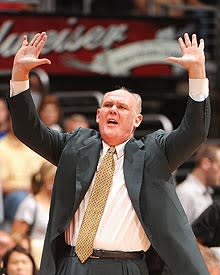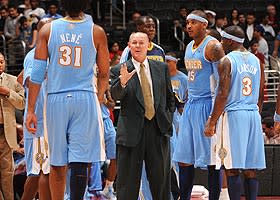Season brings fresh start for Nuggets coach
DENVER – When Denver Nuggets coach George Karl walks onto the court Wednesday night, he’ll welcome another NBA season and try to further distance himself from his most recent fight with cancer.
Karl has not coached a regular season game since March 16. He missed the last month of the season and the Nuggets’ first-round playoff loss to the Utah Jazz while battling throat and neck cancer. Wednesday’s season opener against the Jazz, he hopes, will finally bring some sense of normalcy.
“I’ve already received so much meaningful bonding because of this experience,” Karl said, his voice still scratchy from the radiation and chemotherapy treatment. “But that will maybe be the closure of it. That will be the celebration. I don’t know if I’ll cry, but I’m sure I’ll get goose bumps.
“I’m sure it will be a memorable evening. But the most memorable thing for me as a competitor is making sure we kick Utah’s butt.”
Compared to the way the Nuggets finished last season, Karl’s return will already be considered a victory. Denver was 46-22 at the time of Karl’s departure last season and still had a chance of challenging the Los Angeles Lakers for the Western Conference’s best record. But with Karl gone and starting forward Kenyon Martin(notes) sidelined with a knee injury, the Nuggets split their final 14 regular season games under assistant coach Adrian Dantley, then lost to the Jazz in the opening round of the playoffs in six games.
“When a guy has two aces and you have two fours, you got a bad hand,” Karl said. “I think the hand that they were dealt was too difficult to overcome.”
Said Nuggets forward Carmelo Anthony(notes): “We were drained emotionally, and as much as we tried to cover it up or tried to get through it was still tough.”
Within the organization, there was some concern Karl might never coach again. He lost 50 pounds and suffered rashes and burns during treatment. He struggled to speak, and swallowing was even more difficult, necessitating the use of a feeding tube. He had eight chemotherapy treatments and underwent radiation treatment five days a week for seven weeks. The memories still haunt him.
“My days that were the most difficult were the ones when I had radiation at 8 o’clock in the morning and I had chemotherapy after,” Karl said. “You go into this room that has a machine that looks like a robot [with] a laser beam. It doesn’t feel human. … Then they stick a tube in your arm and you’re taking a substance that definitively kills cells in your body, and you’re around a lot of people that aren’t healthy.
“The whole room has 20 people doing the same thing. And that’s where I think I got emotionally depressed at times.”
When he was honored at a fundraiser for children with cancer in July in Las Vegas, Karl still looked a long ways from returning to coaching. He was weak and his voice remained a whisper. By August, however, he had regained some of his strength after receiving positive test results about his recovery.
Karl, 59, wasn’t – and isn’t – ready to stop coaching, but he will make changes. He plans to spend fewer hours in the office, giving his assistant coaches more responsibility and allowing him to be more “family oriented” with his life partner, Kim Van Deraa, and 6-year-old daughter, Kaci. And after long or demanding road trips, he might stay overnight and fly back solo on a commercial plane to get more rest instead of taking the team’s charter immediately after the game.
“I’m not going to strain myself or stress myself to the point where I am hurting myself,” Karl said. “Health is still going to be No. 1. But I think the juice and excitement of coaching will also be healthy, too.”
Karl has stayed in good spirits, but he returns to a franchise that has undergone significant change – and could be headed for more.
Front-office executives Mark Warkentien and Rex Chapman have been replaced by new vice president of basketball operations Masai Ujiri. Owner Stan Kroenke has turned over the reins of the franchise to his son Josh, who is 30. Beloved assistant coaches Tim Grgurich and Jamahl Mosley left. Karl was especially close to Grgurich and Warkentien, calling both his “comfort zone.”
“We didn’t work as a team as well as we should’ve,” Karl said. “It might have been my fault. It might have been my personality. I have no idea. I think any time something kind of breaks down, it’s everybody’s fault. Why didn’t we fix it before it broke?”
The Nuggets tried to strengthen their roster in the offseason by signing forward Al Harrington(notes), but Martin remains out while recovering from his knee injury. Of most importance: Anthony has sought a trade after rebuffing the Nuggets’ attempts to sign him to a three-year, $64 million contract extension.
Karl believes the Nuggets have the talent to be stronger than the team he took to the West finals two seasons ago. But that obviously centers on Anthony remaining in Denver, and he’s given no indication he’ll back off his trade request. The Nuggets are expected to further explore their trade options with him after Dec. 15 when free agents who were signed in the summer can be traded.
“I’m not going to let ’Melo’s situation damper my enthusiasm,” Karl said. “I think I have an organization that is trying to change in a very positive way. Masai and I have a very good relationship. I think Josh Kroenke is a very good guy. In the last six to eight weeks we’ve had the best communication amongst ourselves that we’ve had in a couple years.
“I hope that continues. I want that to continue. I want that energy coming out to the team. And ’Melo, I’m going to be professional with him. And that’s just not Melo, that’s everybody.”
Karl is in the last season of his contract. Even so, Ujiri says Karl will eventually be re-signed to an extension, keeping him a Nuggets coach for the foreseeable future. Prostrate cancer failed to end Karl’s career in 2005, and he’s not willing to let his most recent fight do it, either. If it’s up to him, he’ll coach another five or six years in Denver.
“For me, going through what I’ve gone through, I look at this as a good thing,” he said. “I look at this as a privilege.”



